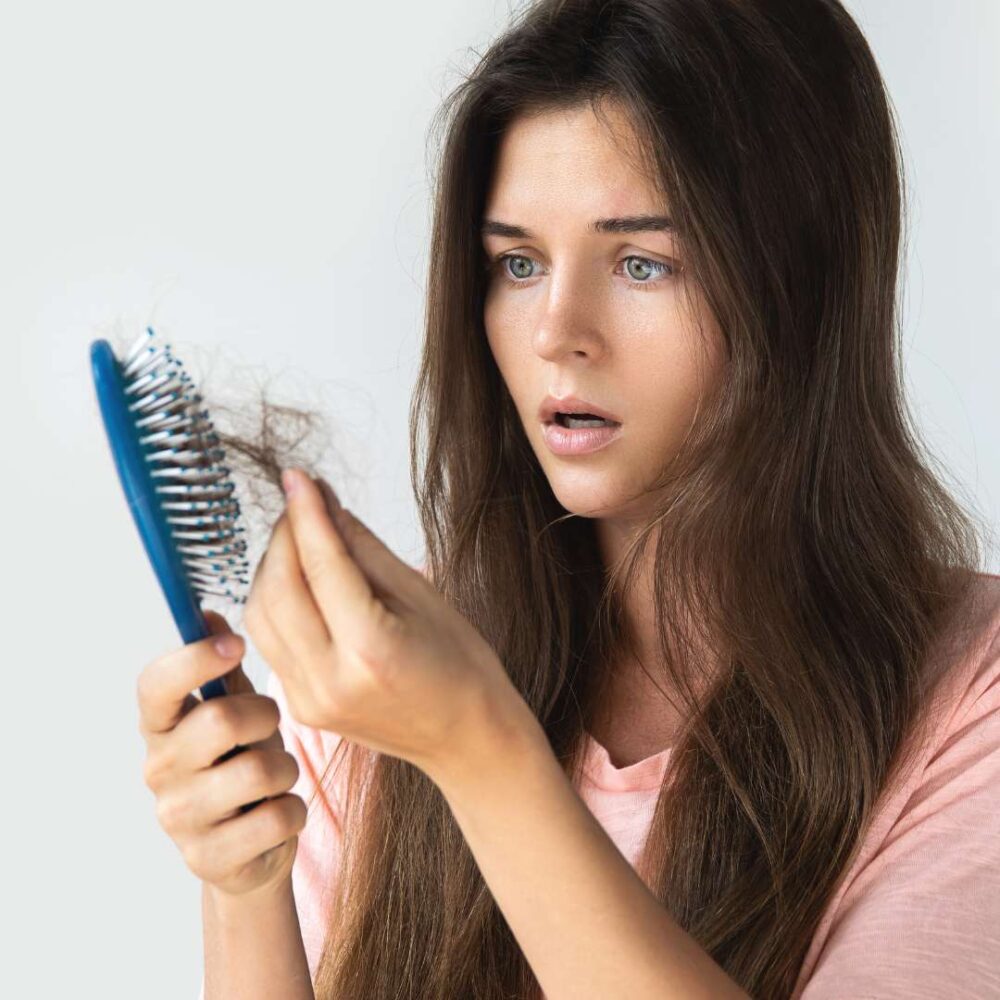
So, I've been pondering lately about how anxiety is such a very common issue in our society today. It affects millions of millions of people all over the world, including me and maybe even you. Anxiety disorders can come in several types like generalized anxiety disorder, social anxiety, phobias, or even panic attacks.
How much can anxiety affect our physical health? We know it can cause cardiovascular complications, but it can also cause thinning hair and general hair loss.There are a couple different ways that anxiety causes hair loss, including elevated cortisol, but how anxiety and hair loss is related is still being worked out in the lab.
So in this article, let's talk more about how anxiety may cause you to lose hair, and what the recent studies show. I'll also cover some management plans for managing anxiety and discuss how CBDA (cannabidiolic acid) might be a helpful natural remedy.
Article Highlight
- It's really true that anxiety can really cause health problems, even messing with your hair and causing it to fall out more than the regular.
- And did you know that the impact of anxiety on hair loss can be both physical, like stress hormones affecting our hair follicles and emotional, like anxiety worsening into hair-pulling habits to some people?
- For you to deal with the anxiety-related hair loss you are dealing with, you'll need to combat the root cause, which is anxiety itself. Several treatments could help depending on the advice of your mental health provider.
- Some natural compounds, such CBDA, are found to potentially help reduce anxiety and ultimately its effects on hair loss.
Understanding the Relationship: Anxiety's Impact on Hair Loss
Basically, anxiety, as defined by the American Psychiatric Association and supported by the research of the National Institute of Mental Health, means you persistently feel uneasy, worried, and fearful like you're in actual danger. This can lead to anxiety disorders and really impact your daily functioning and general well-being.
So, it's very important for you to understand what anxiety is and how it can actually cause hair loss.
How hair grows
Lets not get into the weeds too much on this, but lets set out some basics on hair growth to understand how we may lose it and what to do.
Hair is one of the few places in your body that continues to regenerate over your lifetime. It has three main cycles:
- Growth (anagen): during this phase, the hair follicle and stem cells differentiate and grow, leading to new hairs being produced. This stage can last years.
- Transition (catagen): this phase is characterized by a retraction of the size of the follicle, and the cells go into quiescence, with minimal to no hair growth.
- Rest (telogen): in this part, the cells in the follicle is completely inactive, and goes into dormancy.
Effects of anxiety on hair loss
Anxiety disorders can cause a number of physiological changes that can affect the rate of growth and loss on the scalp.
DHT and anxiety
You may have heard that DHT (a hormone derived from testosterone) can cause hair loss, but this is a complicated area and can depend on a number of other contributing factors. We do know that anxiety disorders have significant impacts on testosterone levels, and may also contribute to DHT levels.
However, the role of hormones and anxiety in hair loss is not well understood, and may not even be the main contributing factor.
Anxiety, cortisol, and hair loss
So, what happens is that when you're stressed out, your bodies release hormones like cortisol that can mess with your physical health causing hormonal imbalance and affect your natural hair growth cycle.Excess anxiety has been linked to a number of symptoms associated with hair loss:
- Telogen effluvium. A condition where hair follicles are transitioned to the resting phase where hair stops growing.
- Trichotillomania. This is where patients actively pull out their hair as a mechanism of dealing with their stress. Whether from the scalp or other parts of the body, it is not uncommon in patients with chronic high levels of anxiety.
- Alopecia areata. Here the body directly attacks the hair follicles because it recognizes an antigen as foreign. While not a common autoimmune disease, it has been associated with anxiety disorders and increased cortisol levels.
It now appears that elevated levels of cortisol affects certain cells in the follicle leading to reduced or loss of hair growth entirely.
When you're dealing with hair loss caused by anxiety disorders, it can be really challenging, both on your physical and mental wellbeing. But you can actually prevent and treat hair loss. You can do this by understanding what's making you anxious in the first place.
Treatment and Management of Anxiety-Related Hair Loss
So, to treat and manage hair loss caused by anxiety disorders, you should take some steps to address them. There are a number of non-medical interventions which can help you recognize and change the negative thoughts that fuel your anxiety.If your wondering, here are some interventions that studies have shown to help with anxiety and decrease cortisol levels:
- Mindfullness meditation: In this study with medical students, practicing meditation on a daily basis was shown to reduce anxiety and decrease levels of cortisol.
- Resistance training: Lifting weights has been shown to improve anxiety scores and decrease cortisol levels in healthy adults.
- Better sleep hygiene: Lack of sleep has been well correlated with changes in cortisol and other hormones. In this study of shift workers with poor sleep, elevated cortisol amounts were found in their hair, indicating long term chronic exposure to higher cortisol levels.
In some cases, a doctor might prescribe certain medications to help you manage anxiety and keep hair-pulling behaviors in check.
Besides dealing with anxiety, it's super important to take good care of our hair and scalp during this time. It's advisable that you use gentle hair care products, stay away from heat styling tools, and don't mess with your hair too much so you can avoid causing more damage.
And remember this, anxiety can lead to hair loss in both physical and psychological factors. When you understand these connections and combat your anxiety, you may find the key to preventing and treating hair loss.
The Role of CBDA in Anxiety and Hair Loss
You might have heard about CBDA, or cannabidiolic acid. This amazing substance is a non-psychoactive compound you can find in raw cannabis and hemp plants. Interestingly, it's actually the precursor to CBD, a well-known cannabinoid with a whole range of therapeutic benefits. Lately, researchers have been exploring CBDA and clinical trials and systematic review have shown that it might help with boosting your mental health and combat anxiety and its related symptoms, including hair loss. Let's dive into this a bit more!
CBDA and Anxiety
So, CBDA interacts with your body's endocannabinoid system (ECS), which is super important for regulating our mood, stress levels, and anxiety. The ECS is made up of endocannabinoids, receptors, and enzymes that all work hand and hand to keep your body in balance.
Beyond the effects of CBDA on the ECS, CBDA has also been shown to activate serotonin receptors, such as 5HT1A. The serotonin system has long been associated with controlling mood, and is often a target for patients with depression.
CBDA and Hair Loss
Now, there isn't a ton of research on CBDA's direct impact on hair loss, but its potential benefits in reducing anxiety could indirectly help prevent hair loss caused by stress. By easing anxiety, CBDA may aid normalize our hair growth cycle, boost the health of your hair follicle and reduce hair shedding that's associated with anxiety.
Plus, CBDA has some anti-inflammatory properties that might benefit people experiencing hair loss due to inflammatory scalp illness. Inflammation can damage your hair follicle and mess with hair growth. So when you reduce inflammation, you could potentially promote healthier hair growth through CBDA.
Conclusion
So, just to wrap things up, anxiety can definitely cause hair loss in more ways than one. It messes with your hair's natural growth cycle, causing it to shed more than it should. Anxiety can also make habits like hair pulling even worse, leading to even patchy hair loss. That's why it's really important for you to deal with your anxious thoughts and feelings when trying to combat hair loss.
CBDA shows a promise in reducing anxiety and its effects on our hair. But take note that we still need more research to fully understand how it impacts hair loss. Nonetheless, CBDA's extra anti-inflammatory properties could also help support healthier hair growth.If you have a history of liver complications or are taking multiple medications, we always recommend to speak with a health care provider before trying.
Finally, take care of yourself, both mentally and physically, and work towards a healthier life. It is important for you to remember that eating a healthy diet and exercising can boost your overall wellbeing and alleviate anxiety symptoms like hair loss.



